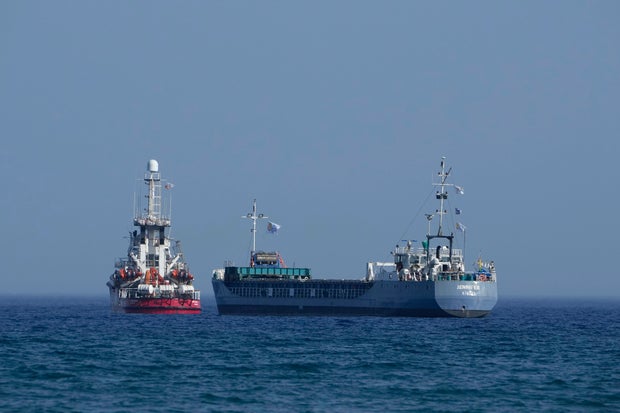A three-ship convoy left a port in Cyprus on Saturday with 400 tons of food and other supplies for Gaza as concerns about hunger in the territory soar.
World Central Kitchen said the vessels and a barge were carrying an estimated 300 tons of ready-to-eat items like rice, pasta, flour, legumes, canned vegetables and proteins that were enough to prepare more than 1 million meals. Also on board were dates, which are traditionally eaten to break the daily fast during the holy month of Ramadan.
Earlier in March, World Central Kitchen, which is led by celebrity chef José Andrés, brought 200 tons of food, water and other aid to the Palestinian territory via an Open Arms ship. That was the first food delivery made by sea since the outbreak of the war.
The United Nations and partners have warned that famine could occur in devastated, largely isolated northern Gaza as early as this month. CBS News previously reported that an estimated 1.7 million people in Gaza have been displaced in the territory, according to the United Nations, with many having no access to food, water, medicine or appropriate shelter.
World Central Kitchen told CBS News that it has sent more than 37 million meals to the territory since Oct. 7, when Hamas militants launched a terror attack in Israel that triggered the war. World Central Kitchen also said it opened more than 60 community kitchens in the territory. The organization has also airdropped meals into the region, and delivered food to families in Lebanon who have been displaced by the conflict.
Petros Karadjias / AP
Humanitarian officials say deliveries by sea and air are not enough and that Israel must allow far more aid by road. The top U.N. court has ordered Israel to open more land crossings and take other measures to address the humanitarian crisis.
Meanwhile, the United States welcomed the formation of a new Palestinian autonomy government, signaling it is accepting the revised Cabinet lineup as a step toward political reform.
The Biden administration has called for “revitalizing” the West Bank-based Palestinian Authority in the hope that it can also administer the Gaza Strip once the Israel-Hamas war ends. It is headed by Palestinian President Mahmoud Abbas, who tapped U.S.-educated economist Mohammad Mustafa as prime minister earlier this month.
But both Israel and Hamas — which drove Abbas’ security forces from Gaza in a 2007 takeover — reject the idea of it administering Gaza, and Hamas rejects the formation of the new Palestinian government as illegitimate. The authority also has little popular support or legitimacy among Palestinians because of its security cooperation with Israel in the West Bank.
The war began after Hamas-led militants stormed across southern Israel on Oct. 7, killing 1,200 people, mostly civilians, and taking about 250 others hostage.
More than 400 Palestinians have been killed by Israeli forces or settlers in the West Bank or east Jerusalem since Oct. 7, according to local health authorities. Dr. Fawaz Hamad, director of Al-Razi Hospital in Jenin, told local station Awda TV that Israeli forces killed a 13-year-old boy in nearby Qabatiya early Saturday. Israel’s military said the incident was under review.
A major challenge for anyone administering Gaza will be reconstruction. Nearly six months of war has destroyed critical infrastructure including hospitals, schools and homes as well as roads, sewage systems and the electrical grid.
Airstrikes and Israel’s ground offensive have left 32,705 Palestinians dead, local health authorities said Saturday, with 82 bodies taken to hospitals in the past 24 hours. Gaza’s Health Ministry doesn’t distinguish between civilians and combatants in its toll but has said the majority of those killed have been women and children.
Israel says over one-third of the dead are militants, though it has not provided evidence to support that, and it blames Hamas for civilian casualties because the group operates in residential areas.
The fighting has displaced over 80% of Gaza’s population and pushed hundreds of thousands to the brink of famine, the U.N. and international aid agencies say. Israel’s military said it continued to strike dozens of targets in Gaza, days after the United Nations Security Council issued its first demand for a cease-fire.
Aid also fell on Gaza. The U.S. military during an airdrop on Friday said it had released over 100,000 pounds of aid that day and almost a million pounds overall, part of a multi-country effort.
Israel has said that after the war it will maintain open-ended security control over Gaza and partner with Palestinians who are not affiliated with the Palestinian Authority or Hamas. It’s unclear who in Gaza would be willing to take on such a role.
Hamas has warned Palestinians in Gaza against cooperating with Israel to administer the territory, saying anyone who does will be treated as a collaborator, which is understood as a death threat. Hamas calls instead for all Palestinian factions to form a power-sharing government ahead of national elections, which have not taken place in 18 years.






